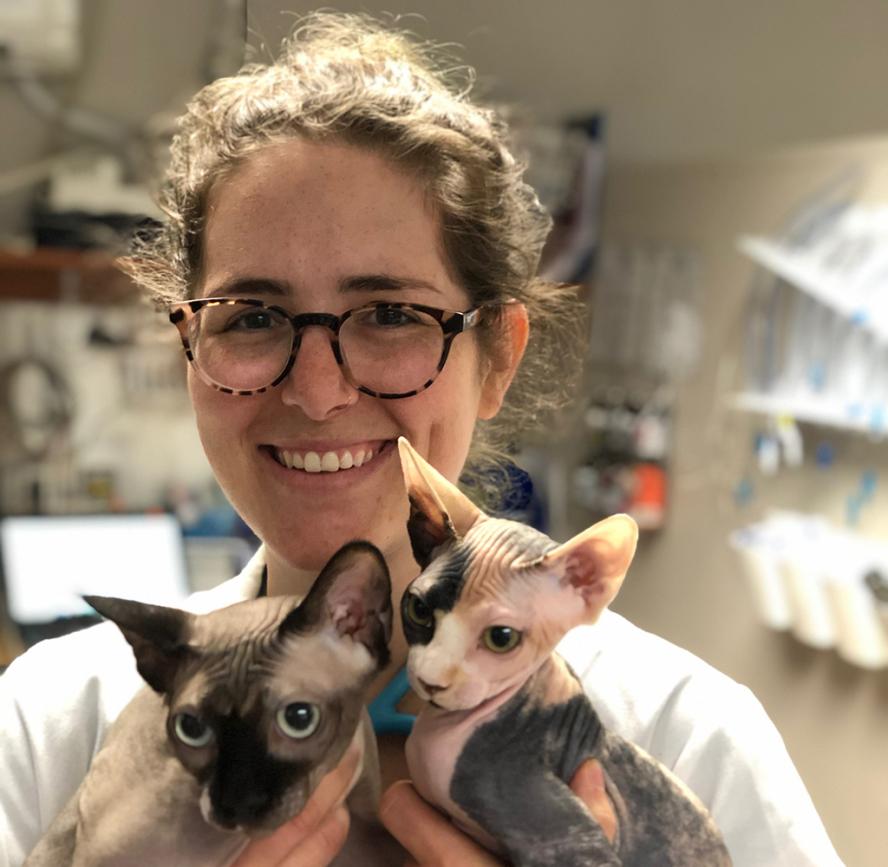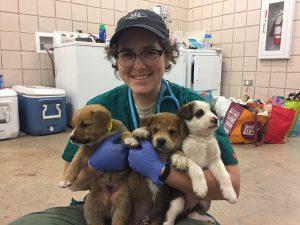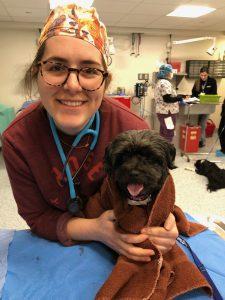-
About
- Leadership & Faculty
- News & Events
-
Academics
- Graduate
- Advanced Clinical Training
- Continuing Education
-
Student Life
-
Research
-
Hospitals & Clinics
- Emergency Care
- Hospital Services
-
Community Outreach
- Volunteer
Finding Fulfillment in Shelter Medicine
A longstanding love of animals led Adrian Dannis, V20, to discover a rewarding career—and herself

Even as a child, Adrian Dannis could tell that her dad loved his job as a lawyer working in public education and found it gratifying to be doing good for others. “I wanted to find a career that was as fulfilling for me,” she says.
Growing up in in the San Francisco Bay area, Dannis always had a lot of pets, from dogs and cats to chickens and turtles. She loved science and art throughout her schooling. “I thought about being an artist or a research scientist,” she explains. “But I always came back to animals. I did a big art show in high school once, and the theme of my show was animals and nature.”
To balance her passions, Dannis majored in biochemistry and focused on research during the school year at Reed College, then got hands-on experience with animals during summer breaks. After her freshman year, she worked with a veterinarian for the first time, at a wildlife rehabilitation center in southern California.
Dannis became enthralled by the human-animal bond while volunteering the following year with the Portland Animal Welfare Team, which holds monthly clinics for homeless people with pets. “When I started interacting with these people and their animals and saw the human-animal bond—they had very little, but because they had their dog or their cat, they had a family—that was a gamechanger for me.”
It reached a point when summer work was no longer enough for Dannis, however. Every chance she got, she volunteered to work with animals. She discovered RAVS (Rural Area Veterinary Services) clinics and volunteered at the one- to two-week programs whenever possible.
“The winter of my senior year, I went on my first RAVS trip to Arizona, and that sealed the deal for me,” she recalls. “I thought this was a way that I could help animals, have a science aspect, and make a direct impact on people’s lives.”
After graduating from college, Dannis took a job as a veterinary assistant at the Oregon Humane Society in Portland. Her time there helped solidify her decision to enroll in veterinary school. “Talking with the people there helped confirm for me that the human-animal bond is real and it’s worth protecting and fighting for,” she says. “And if I was a veterinarian, I would be able to do that.”
Dannis knew she wanted to attend Cummings School of Veterinary Medicine from the moment she arrived on campus for her interview she was “over the moon” when she was accepted. However, as a queer woman, she often felt uncomfortable being fully herself, and a move across the country gave Dannis pause.
“I was really nervous coming even just from Oregon to Massachusetts—both the culture change and how I would fit into veterinary medicine,” she says.
“I believe that everybody should be able to be comfortable and that we should be asking pronouns and there should be gender-neutral bathrooms. There were a lot of things that I felt very strongly about, but I wasn’t sure how it was going sit with not only my classmates but with my future workplaces,” Dannis explains. “That has been a big challenge throughout much of my life—staying true to myself and not stifling my personality, my passions, and my identity to feel like I fit in.”
Dannis quickly found her classmates, faculty, and staff at Cummings School to be supportive and veterinary medicine to be a welcoming profession for all. Due to her identity struggles, however, shelter medicine in particular speaks to her.
“I feel like shelter medicine just encompasses this idea that we are all the same. We’re all humans,” says Dannis. “I have spent all this time absorbing veterinary knowledge, but it’s also so easy for me to take the five minutes to take complicated information and present it in a way that meets owners on their level.”
At Cummings School, Dannis had the chance to immerse herself in activities revolving around another passion—cats. She was a member of the leadership board of Tufts’ “cat club,” the student chapter of the American Association of Feline Practitioners. Dannis worked every feral cat clinic as a student technician at the Luke and Lily Lerner Spay/Neuter Clinic. And she quips that she “was that person in the lecture that always asked, ‘What about cats?’”
After commencement, Dannis will pursue a one-year rotating small-animal internship at Angell Animal Medical Center in Boston. She is excited to have been inducted into the Tisch College of Civic Life’s Honos Civicus Society in recognition of her important contributions during her time at Tufts. She hopes that it will provide her with a network of like-minded professionals that can help solve issues across the country.
Now ready to move forward with her professional career, Dannis has found that sense of fulfillment she has always seen in her father.
“As a vet, I would love to improve community medicine and access to medicine to the point that animals that would typically need to be surrendered to a shelter would be able to get the care they need and stay with their families,” she says. “Of course, I cannot accomplish that alone on a larger scale, but I hope I can move us toward this goal within whatever smaller community I end up working in.”
Department:
DVM Program

